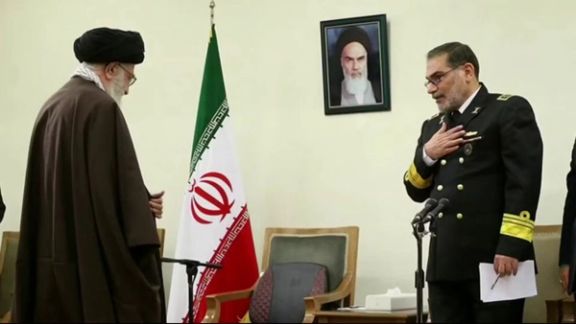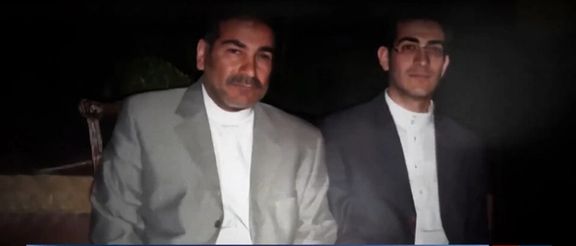Report exposes how Khamenei advisor’s son became an oil tycoon

A Bloomberg investigation has revealed how the son of Iran’s former national security chief has become a significant figure in global oil markets, even in the face of US sanctions.

A Bloomberg investigation has revealed how the son of Iran’s former national security chief has become a significant figure in global oil markets, even in the face of US sanctions.
Hossein Shamkhani’s father, Ali Shamkhani, served as the secretary of Iran’s Supreme National Security Council (SNSC) for almost a decade until last year, but he remains an advisor to Supreme Leader Ali Khamenei.
The Shamkhanis have been known to Iranians as insiders and Hossein, like the children of many other Iranian officials, has been implicated in several scandals over his diverse portfolio in shipping and international oil trade. However, the Bloomberg report has shed new light on his recent ventures, including his Dubai-based company, Milavous Group Ltd.
Read more: Tehran Media Speculate On Security Chief’s Dismissal
In the heart of Dubai’s corporate skyline, the relatively obscure firm quietly rented an office two years ago. Few had heard of the company, yet it soon emerged as a significant force in global energy markets. At the helm of the operation, according to insiders, is Hossein Shamkhani -- a man known in trading circles as “Hector” or simply H. Despite his low profile and sanctions on Tehran’s oil trade, Shamkhani has become one of the most influential figures in the distribution of Iranian oil worldwide.

Based on interviews with more than a dozen sources familiar with the matter, who requested anonymity to discuss confidential business dealings, Bloomberg has uncovered details about Hossein Shamkhani's activities that suggest a complex, sprawling web of interconnected businesses are pushing vast quantities of Iranian and Russian oil into the market.
“People familiar with Shamkhani’s empire said he effectively oversees an intertwined web of companies, with Milavous operating as one of the parent firms. Business ownership, shareholding and control information are easy to obscure, and other executives have been formally registered as the owners and managers, the people said.”
His influence is so pervasive that the companies he oversees have a substantial global footprint, even though many in the industry remain oblivious to his true identity and the source of the crude they are trading.
Milavous, through its subsidiaries, engages in the blending and rebranding of crude oil and various petroleum products from Iran and Russia in third-party jurisdictions, such as the UAE port city of Fujairah. Additionally, it handles oil from countries that are not subject to sanctions. Such methods can obscure the origins of the oil and fuel, making it difficult for clients trying to determine its provenance, Bloomberg cited Matthew Levitt, a former counterterrorism official at the Treasury Department and FBI.
Milavous and other companies within Shamkhani’s network reportedly supply oil to the industry’s giants, including China’s Sinopec, Chevron in the US, and BP in the UK. While these corporations maintain they comply with all laws and sanctions, their connections to Shamkhani’s network highlight the opaque world of policing global oil trade.
According to Bloomberg sources, Milavous has generated billions of dollars in sales with its turnover in 2022 amounting to some $15 billion.
Unlike his father, Hossein Shamkhani has not been listed as a sanctions violator. Additionally, the UAE has not banned companies from trading crude oil from Iran or Russia. Entities within his network also engage in significant business dealings with Chinese buyers, often conducting transactions in yuan and beyond the purview of American sanctions, Bloomberg sources said.
However, if the US government decides to sanction any UAE-based company involved in violating US regulations, it can add them to its sanctions list. This can be especially problematic for banks facilitating such trades.
Despite not being personally sanctioned, Shamkhani has faced scrutiny from US authorities. Dozens of ships believed to be under his control have been sanctioned by the US Treasury, but their links to him were not publicized. Apparently, the US Treasury Department can sometimes find it more effective to target tankers rather than individuals because of frequent changes in ownership.
Back in 2022, a cargo ship reportedly belonging to the Admiral Shipping Company that Iranian media said is owned by Hossein Shamkhani and his brother Hassan was impounded in one of India’s ports.
Shamkhani and Milavous have repeatedly denied any involvement in illicit activities. In a written statement, Shamkhani categorically rejected claims of a connection to Milavous, asserting that he has no control over any oil companies or trading networks. Mohamed Al Hashmi, the Managing Director of Milavous, likewise dismissed allegations of ties to Shamkhani or involvement in Iranian or Russian oil trading. However, multiple sources suggest that Shamkhani's influence extends far beyond public knowledge. He is believed to have been instrumental in establishing dozens of companies.
Shamkhani's network extends beyond Iran. He spent time studying in Moscow and Beirut before returning to Tehran to earn a Master of Business Administration. His ties to Russia have proven especially valuable as Tehran and Moscow have forged deeper economic and military partnerships in response to Western sanctions.
Hossein Shamkhani's ascent in the oil industry is inextricably linked to his family's legacy. His father has been a towering figure in Iran's military and security establishment for decades and like many of his peers, he is dogged by scandals. Apart from reports about his sons -- Hassan and Hossein -- owning dozens of businesses, there have also been reports about the extravagant lifestyle of his family members in Iran and abroad. Iran International’s investigative journalist Mojtaba Pourmohsen has published several exposés about the family corruption, including his nephews Mo’ud and Naji Shamkhani.
Controversies reached their peak following allegations of extravagant properties and bank accounts held by Shamkhani’s family, including those of his toddler grandson.
In 2022, the Shamkhani family was implicated in the collapse of a building in southwestern Khuzestan province that killed scores of people. The owner of the building, Hossein Abdolbaghi, a well-connected businessman, had broken multiple regulations when constructing the building, having enjoyed the backing of officials including members of the Shamkhani family.
While the elder Shamkhani encouraged his son to pursue a career in the private sector, his connections and influence have undoubtedly played a pivotal role in Hossein's success.